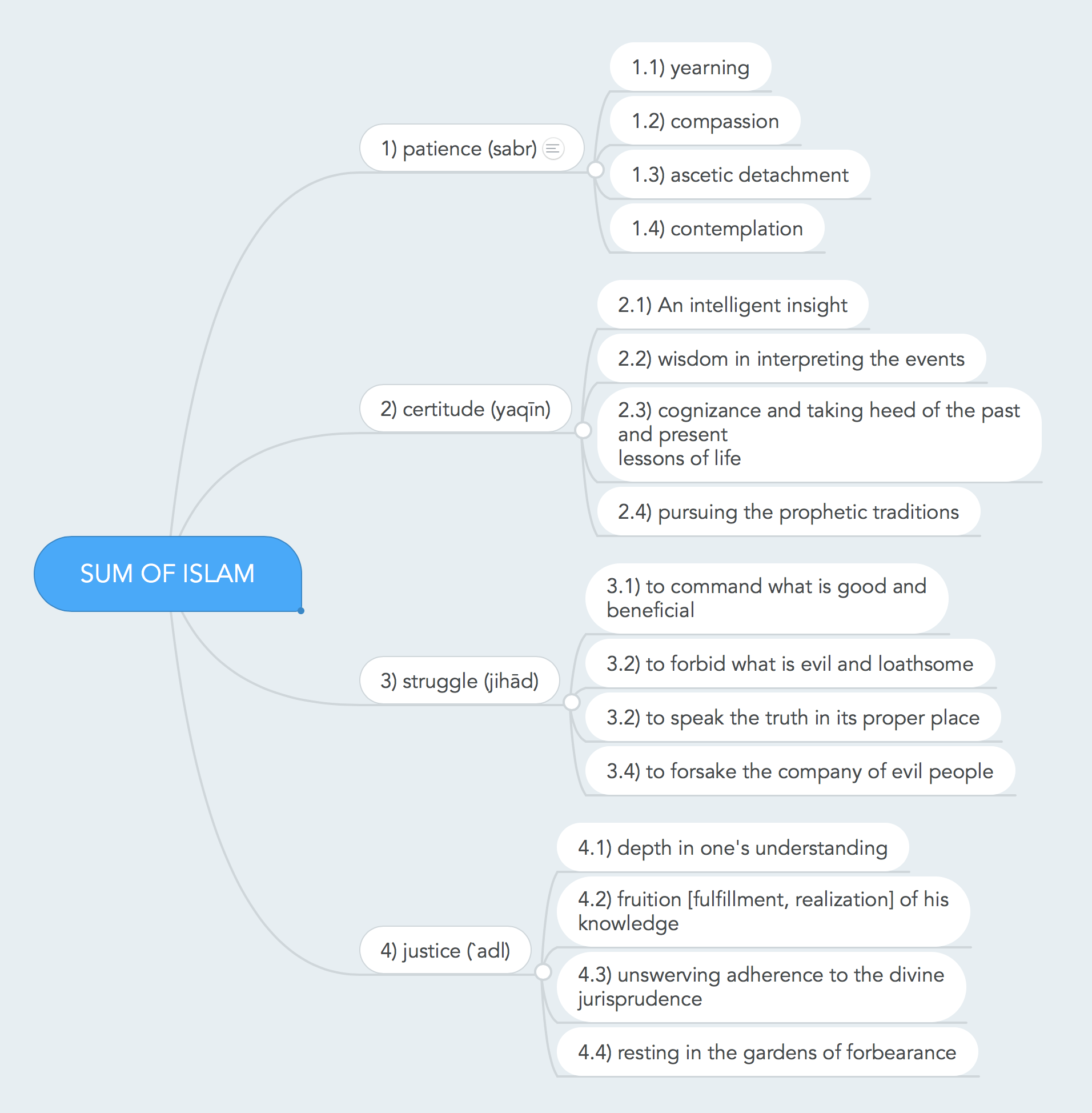
bit.ly/_sumisl
From
The Beauty of the Righteous & Ranks of the Elite [*]
ʿAli replied: “Yes indeed, I have heard God's messenger
ﷺ say,

1) patience (sabr);
2) certitude (yaqīn);
3) struggle (jihād); and
4) justice (ʿadl).
From patience evolve four branches,
yearning;
1.2) compassion;
1.3) ascetic detachment; and
1.4) contemplation.
→ Therefore,
whosoever yearns for the heavenly paradise must control his passion, and
whosoever fears burning in hell-fire must step away from what is forbidden,
and whosoever develops ascetic detachment from this world must regard his
adversities as negligent, and whosoever awaits death must hasten to do
good.
On the other hand, from certitude branches four shoots;
→ Therefore, whosoever develops an intelligent insight, he will be able to interpret the past and current events with wisdom, and he will recognize and take heed of the lessons of life. Whosoever develops such true knowledge and wisdom, he will unavoidably pursue the prophetic traditions, and finally, whosoever pursues the prophetic traditions, he will be assembled among the earlier (al-awwalīn) and the most blessed cluster of believers.
As for the branch of struggle (jihād), it
also has four branches,
3.1) to command what is good and beneficial;
3.2) to
forbid what is evil and loathsome;
3.2) to speak the truth in its proper
place; and
3.4) to forsake the company of evil people.
→ Therefore, whosoever commands what is good and beneficial, he would have become the backbone of the believer, and whosoever forbids what is evil and loathsome, he would have compelled the spite of a hypocrite to yield to the truth, whosoever always speaks the truth, he would have paid his dues and proved the truthfulness of his religious adherence, and whosoever forsakes the company of evil people, he would have spared himself the wrath of Allah, and finally, whosoever becomes angry for the sake of Allah, then Almighty Allah will defend him imperiously.
Finally, the branch of justice also has four shoots,
4.1) depth
in one's understanding;
4.2) fruition [fulfillment, realization] of his knowledge;
4.3) unswerving adherence
to the divine jurisprudence; and
4.4) resting in the gardens of forbearance.
→ Therefore, one who fathoms [gets to the bottom of] the depth of matters can explain the beauty
of knowledge; one who guards the fruit of knowledge will recognize and
adhere to the divine jurisprudence (fiqh); and one who recognizes the boundaries
of the divine jurisprudence will be able to enter and enjoy the gardens
of forbearance, and finally, one who enjoys the gardens of forbearance
will be shielded against the bitterness of trials and visitations, and
will he live among people who will delight in his company.”
It is also said that spiritual purity means to exclusively
and happily
seek one's Beloved (God) for all of one's needs.
note:
[1] Khlās bin 'Amru also reported this tradition, re ʿAli, describing the epithet of Islām (acceptance of God's message), while other narrators also reported this tradition, re al-Isbaʿ bin Nabāta, re ʿAli, depicitng Imān (faith).
© 1996-2005 Pearl Publishing House


Related texts
![]() The Dīn of Islam
The Dīn of Islam
![]() Islam Q & A
Islam Q & A
![]() Narration of our liege-lord ʿAli from al-Hasan al-Basri
Narration of our liege-lord ʿAli from al-Hasan al-Basri